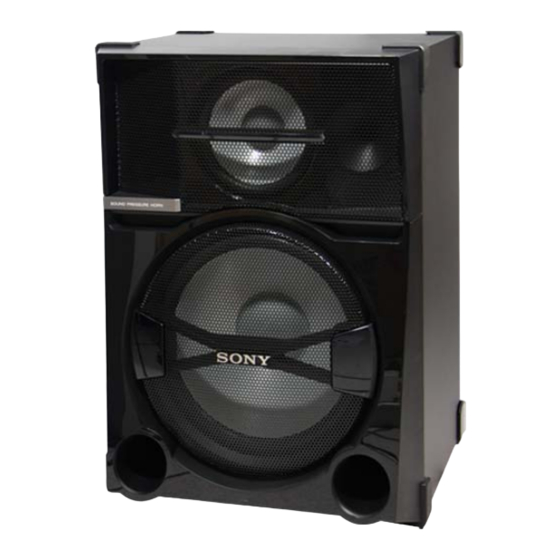Sony SS-SHAKE33 Panduan Petunjuk Pengoperasian - Halaman 39
Jelajahi secara online atau unduh pdf Panduan Petunjuk Pengoperasian untuk Sistem stereo Sony SS-SHAKE33. Sony SS-SHAKE33 48 halaman. Home audio system
Juga untuk Sony SS-SHAKE33: Panduan Servis (10 halaman)

• If the transfer and erase operations are
repeated multiple times, the file
structure within the USB device
becomes fragmented. Refer to the
operating instructions supplied with the
USB device on how to deal with this
problem.
• The USB device was disconnected or
the power was turned off during
transfer. Delete the partially-transferred
file, and perform the transfer again. If
this does not fix the problem, the USB
device may be broken. Refer to the
operating instructions of the USB
device on how to deal with this problem.
Audio files or folders on the USB
device cannot be erased.
• Check if the USB device is write-
protected.
• The USB device was disconnected or
the power was turned off during the
erase operation. Delete the partially-
erased file. If this does not fix the
problem, the USB device may be
broken. Refer to the operating
instructions of the USB device on how
to deal with this problem.
There is no sound.
• The USB device is not connected
correctly. Turn off the system and
reconnect the USB device, then turn on
the system and check if "USB A" or
"USB B" lights up in the display panel.
There is noise, skipping, or distorted
sound.
• You are using an unsupported USB
device. Check the information on the
website about compatible USB devices
(page 36).
• Turn off the system and reconnect the
USB device, then turn on the system.
• The music data itself contains noise, or
the sound is distorted. Noise may have
entered during the transfer process.
Delete the file, and try transfer again.
• The bit rate used when encoding audio
files was low. Send audio files with
higher bit rate to the USB device.
"READING" is displayed for an
extended time, or it takes a long time
before playback starts.
• The reading process can take a long time
in the following cases.
– There are many folders or files on the
USB device (page 18).
– The file structure is extremely
complex.
– The memory capacity is excessive.
– The internal memory is fragmented.
"OVER CURRENT" appears.
• A problem has been detected with the
level of electrical current from the
port or
B port. Turn off the system
and remove the USB device from the
port. Make sure there is no problem with
the USB device. If this display pattern
persists, contact your nearest Sony
dealer.
Erroneous display.
• The data stored in the USB device may
have been corrupted, perform the
transfer again.
• The character codes that can be
displayed by this system are as follows:
– Upper cases (A to Z)
– Numbers (0 to 9)
– Symbols (< > * +, [ ] \ _)
Other characters appear as "_".
The USB device is not recognized.
• Turn off the system and reconnect the
USB device, then turn on the system.
• Check the information on the website
about compatible USB devices
(page 36).
• The USB device does not work
properly. Refer to the operating
instructions of the USB device on how
to deal with this problem.
Playback does not start.
• Turn off the system and reconnect the
USB device, then turn on the system.
• Check the information on the website
about compatible USB devices
(page 36).
A
GB
39
